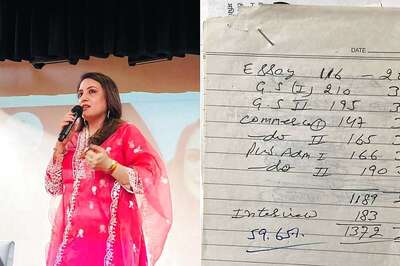
views
New Delhi: Against the backdrop of some sensational sting operations by the media, an official committee has drafted a comprehensive set of guidelines contemplating a series of dos and don'ts for the broadcast media.
Under the guidelines the media persons should identify themselves to potential targets when undertaking such an operation.
The Broadcasting Code and Guidelines, drafted by a sub-committee constituted by the Information and Broadcasting Ministry, has a separate chapter on news and current affairs, which deals in detail on how broadcast journalists should go about their work, including sting operations.
The draft seeks to replace the age-old Programme and Advertising Code.
It spells out a 16-point dos and don'ts for the media, making it clear that channels must not use material relating to 'person's personal or private affair or which invades an individual's privacy unless there is an identifiable public interest reason for the material to be broadcast.
The preamble to the draft code and guidelines states that a need had been felt to regulate the content going into public domain to ensure conformity with acceptable contemporary community standards and to protect the vulnerable sections from harmful and undesirable content on TV.
The basic underlining principle of the code is that the responsibility of complying with the provisions vests with the broadcasting service provider, the preamble says.
Some of the draft proposals say:
- Infringement of privacy in a news-based/related programme is important, but the media must be able to justify its undercover operation as 'warranted' in public interest.
- A broadcasting service provider should avoid any 'unwarranted infringement of privacy' in news-based programmes.
- Channels must not use material relating to 'person's personal or private affair or which invades an individual's privacy unless there is an identifiable public interest reason for the material to be broadcast.
- If the reason for a sting operation is in public interest, then the media should be able to demonstrate that the public interest outweighs the right to privacy.
- A broadcaster can record telephone calls with another party if it has, from the outset of the call, identified itself, explained the purpose of the call and also that it is being recorded for possible broadcast unless it is warranted not to do one or more of these practices.
- If a call has been recorded without explaining to the other party at the time of the call, then the media must obtain consent from the party before broadcast unless it is warranted not to do so.
- Any infringement of privacy in the making of a news-based/related programme should be with the person's and/or organisation's consent or be otherwise warranted.
- If an individual or organisation's privacy is being infringed, and they ask that the filming, recording, or live broadcast be stopped, the BSP should do so, unless it is warranted to continue.
- Legitimate expectations of privacy will vary according to the place and nature of the information, activity or condition in question, the extent to which it is in the public domain (if at all) and whether the individual concerned is already in the public eye.
- Media needs deliberate and transparent guidelines and standards for news programming which need to be followed scrupulously by all.
















Comments
0 comment